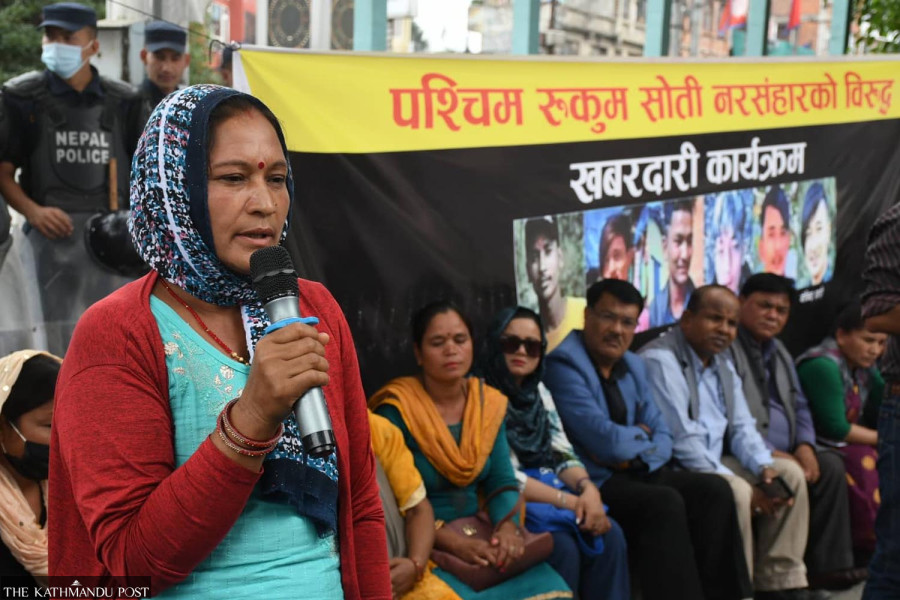National
3 years after Rukum West killings, kin still await justice
Dalit activists accuse major parties of weakening the case to protect the accused, who are non-Dalits.
Tika R Pradhan
Tuesday marked three years of the Rukum massacre, in which six youths, including four Dalits, were brutally killed in a caste-related dispute—and the case is still sub judice in the Rukum West district court.
According to court officials, the final hearing has been scheduled for June 13 after the one scheduled for May 7 was postponed as the judge had to visit Kathmandu on personal business.
“If there is no emergency, the court will give its final verdict on June 13,” said Bishnu Prasad Poudel, information officer at the district court. “It took the court a long time to decide the case as there are 34 defendants, and the issue is complicated.”
Although the evidence gathered by investigators suggests the culprits should get maximum punishment, the court could be a little lenient on them owing to pressure from top politicians, say the lawyers closely following the case.
In one of the worst massacres of the decade, six youths were chased and killed in Soti village of Chaurjahari Municipality in Rukum (West) after a Dalit youth Navaraj BK, 21, along with his friends had reached his girlfriend’s home to take her home as a bride, on May 23, 2020.
Besides Navaraj, Ganesh Budha Magar, Tikaram Nepali, Lokendra Sunar, Govinda Shahi and Sanju BK were also killed in the incident.
Investigation reports suggest that leaders of the ruling parties including the CPN (Maoist Centre), which waged a decade-long bloody people’s war to end caste-based discrimination, were methodically working to weaken the case against the accused.
The report prepared by a high-level parliamentary committee and submitted to the then speaker Agni Sapkota says the incident was premeditated and conspired by the family of a 17-year-old girl that was not happy about their daughter having a relationship with Nabaraj BK, 21, from Bheri Municipality in Jajarkot district as he belonged to a lower caste.
“As far as I know, the evidence collected by the district attorneys was strong enough to establish the crime, but there are still doubts given the pressure from politicians right from the start,” said Mohan Shashankar, an advocate closely following the case. “We cannot predict the court verdict. But we hope justice will be served and the guilty will get enough punishment for such a heinous crime.”
Among the 34 accused, as many as 11 including the mother of Navaraj BK’s lover and two minors have been released on different dates by the Surkhet High Court and the Supreme Court.
Dalit activists have condemned the way the government has been dealing with an event of such gravity in which the United Nations has also expressed its concern.
Parents of the youths who were killed due to their caste told us that their hopes were fading, said Pradip Pariyar, a youth campaigner and rights activist who is also the founder and chair of ‘Dalit lives matter global alliance’. “Even people who would earlier come to offer them solace have stopped visiting.”
Pariyar also expressed concerns over the political influence in the case as some senior leaders have been speaking in favour of the culprits involved in the mass murder.
“The state should have played a proactive role in such a case but it continued to dillydally,” said Pariyar. “One reason could be political influence.”
The role of politicians in this heinous crime seems negative towards victims which can be understood by their statements made in Parliament.
“Dalit factor was not primary in the Rukum Soti incident. No one killed them. They instead died from drowning [in the river] when villagers chased them away,” Janardan Sharma, a Maoist Centre lawmaker from Rukum West had told the House of Representatives three days after the incident.
However, Sharma’s statement was proven wrong by the report of the Poudel-led parliamentary probe committee.
Some Dalit experts said this incident will be a true test of Nepal’s judiciary and even the political class as a whole since the world is keenly following the developments.
“Despite waiting for such a long time, the victims are not fully hopeful that they will get justice and it is going to be a litmus test for our judiciary and even the political parties,” said JB Bishwokarma, a Dalit activist and researcher. “The more serious issue is that political parties didn’t strongly lobby in favour of the victims. This shows how deep-rooted the caste system is in our political parties.”
Bishwokarma, who also heads the Dignity Initiative, said there is still a chance of political influence in the case and therefore rights groups and activists must keep their vigilance high.
Former Nepali Congress lawmaker Prakash Rasaili, who is currently the party’s central committee member, however, said the way Maoist Centre leaders have been trying to influence the ‘crime against humanity’ is nothing but their jettisoning of the cause they championed during the decade-long armed conflict.
“We as Nepalis boast of various successful movements and struggles in the past, but our society’s mindset remains unchanged,” Rasaili told the Post. “If we still fail to make crucial changes in governance to make it more inclusive, the Dalits will have no option but to revolt.”




 9.83°C Kathmandu
9.83°C Kathmandu














